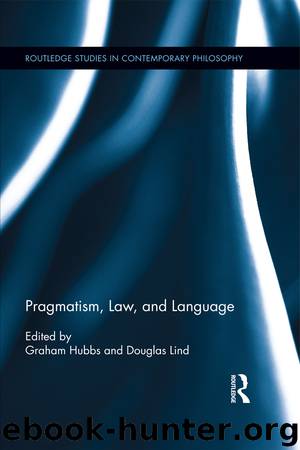Pragmatism, Law, and Language by Unknown

Author:Unknown
Language: eng
Format: epub
ISBN: 9781135086176
Publisher: Taylor & Francis (CAM)
James’s focus on facts, action, and power offers a holistic vision of facts and values in constant development, made by persons, for purposes, ready to be examined and revised by those same or other persons. As philosophers, we seek abstract understandings, but if our subject is real life, we must turn “toward concreteness” and accept that adequacy may be the best we achieve. Understanding Rwanda ’94 requires many kinds of research, including studying documents and conversing with those who were there. One must read and hear testimonies; study trial transcripts and judgments; review historical and sociological research; and one must go to Rwanda, meet the people, listen, and learn. Through their stories, reactions and responses to questions, resistance or acceptance, my Rwandan interlocutors show me if I have got the concreteness wrong, if I fail to understand their norms, if my views distort their reality, and if I fail to see the real exercise of power at work in any particular case. In developing this account, there must be a constant interplay between theory and practice, with ongoing attention to the many participants of the practices described. As interlocutors on such a project, philosophers are adept at pressing the larger issues that move us beyond the particular and beyond one small country. James is right that a pragmatist avoids “closed systems and pretended absolutes.” Here, the abstractions of theory are tested by the concreteness of heinous reality, and the goal is to understand how such a reality could arise, how it can be prevented anywhere, and what it teaches us about persons, societies, and the power of norms. My primary goal in analyzing genocidal language games is more modest: to understand the action-engendering power of changing discursive practices.
Like William James, John Dewey also emphasizes interplay between theory and everyday reality, and how both are sensitive to the importance of delineating power. Dewey says, “The problem of the relationship of theory and practice is not a problem of theory alone; it is that, but it is also the most practical problem of life.”7 James’s complaint against rationalism is that it separates theory from practice. Dewey’s concern is the flip side: practice unguided by theory. Both problems are at work in genocide formation, in political manipulations of populations. Dewey worries that “[t]heory separated from concrete doing and making is empty and futile,” lost without direction.8 Still, the participant might not fully grasp the theory guiding his/her action; the everyday practices of many génocidaires were guided by the theories of others, by manipulations that were embraced because they brought pleasure. Consider Dewey’s concern in light of Michel Foucault’s reminder about the positive force of power. Foucault says:
What makes power hold good, what makes it accepted, is simply the fact that it doesn’t only weigh on us as a force that says no, but that it traverses and produces things, it induces pleasure, forms knowledge, produces discourse. It needs to be considered as a productive network which runs through the whole social body, much more than as a negative instance whose function is repression.
Download
This site does not store any files on its server. We only index and link to content provided by other sites. Please contact the content providers to delete copyright contents if any and email us, we'll remove relevant links or contents immediately.
American Kingpin by Nick Bilton(3886)
Future Crimes by Marc Goodman(3598)
The Meaning of the Library by unknow(2571)
Inside the Middle East by Avi Melamed(2356)
Why Nations Fail: The Origins of Power, Prosperity, and Poverty by Daron Acemoglu & James Robinson(2297)
On Tyranny by Timothy Snyder(2231)
Living Silence in Burma by Christina Fink(2071)
Putin's Labyrinth(2022)
The Mastermind by Evan Ratliff(1937)
The Smartest Kids in the World by Amanda Ripley(1856)
Think Like a Rocket Scientist by Ozan Varol(1819)
Law: A Very Short Introduction by Raymond Wacks(1747)
It's Our Turn to Eat by Michela Wrong(1730)
The Rule of Law by Bingham Tom(1698)
Philosophy of law a very short introduction by Raymond Wacks(1670)
Leadership by Doris Kearns Goodwin(1638)
A Dirty War by Anna Politkovskaya(1630)
Information and Communications Security by Jianying Zhou & Xiapu Luo & Qingni Shen & Zhen Xu(1621)
Civil Procedure (Aspen Casebooks) by Stephen C. Yeazell(1556)
